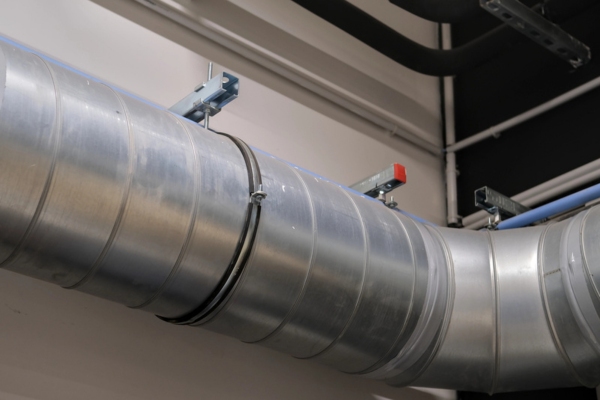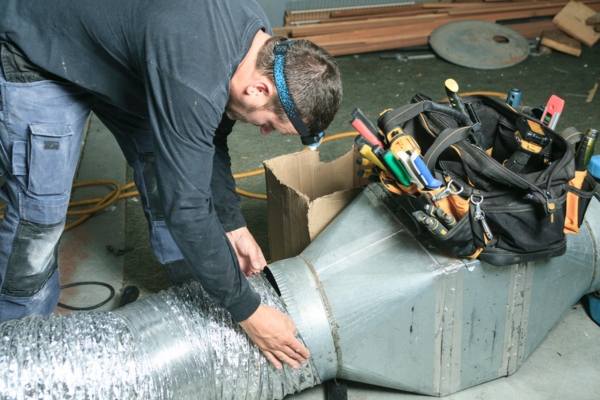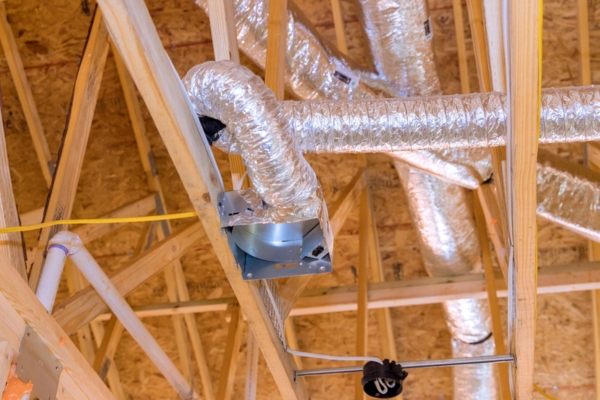Contents
- 1 Typical Lifespan of HVAC Ductwork
- 2 Why Ductwork Matters in Heating and Cooling
- 3 What Influences the Lifespan of HVAC Ductwork
- 4 When It’s Time to Replace Your HVAC Air Ducts
- 5 Is It Necessary to Replace Ductwork with a New HVAC System?
- 6 Frequently Asked Questions About HVAC Ductwork Replacement
- 7 Conclusion
- 8 Call Wilcox Energy for Expert HVAC Services
Issues within your ductwork could be quietly reducing comfort and increasing utility costs. Reliable HVAC performance depends on strong, efficient duct systems, which are the backbone of your home’s heating and cooling setup.
Wilcox Energy, your trusted local HVAC experts, has seen how aging ductwork can compromise comfort and increase energy use. This article outlines major signs that may indicate the need for HVAC ductwork replacement, including material deterioration, restricted airflow, environmental impact, and installation flaws. With this knowledge, homeowners can take the right steps to improve efficiency and restore long-term performance.
Enjoy the Comfort You Deserve: Count on reliable HVAC repair and maintenance to keep your home running smoothly. Contact us today!
Typical Lifespan of HVAC Ductwork

Most ductwork systems last between 15 and 25 years, depending on material quality, installation techniques, routine upkeep, and surrounding environmental conditions.
To determine whether your ducts need repairs or full replacement, it’s best to consult a qualified HVAC technician for a thorough evaluation.
Stay Comfortable Every Season: Rely on professional HVAC service to maintain a balanced home environment. Contact us today!
Why Ductwork Matters in Heating and Cooling

Properly designed ductwork is vital to your HVAC system’s overall performance. Here’s why it’s essential:
- Airflow Distribution: Ducts serve as the pathways that deliver heated or cooled air across your home. When functioning correctly, they help maintain even temperatures in every room, ensuring consistent comfort across your living space.
- Controlled Air Movement: Well-designed ductwork effectively regulates airflow throughout your home. Proper installation ensures balanced distribution, helping eliminate uneven temperatures and providing consistent comfort in every area.
- Improved Indoor Air Quality: Your HVAC ducts play a crucial role in maintaining air quality. By working with filtration systems, they help capture dust, allergens, and other airborne particles. Keeping your ductwork clean and in good condition supports a healthier indoor environment.
- Boosted Energy Efficiency: Sealed and properly constructed ductwork helps prevent air leaks, allowing your HVAC system to run more efficiently. Poorly sealed ducts can waste a significant amount of energy and force your system to work harder. Quality installation keeps conditioned air where it belongs, easing the load on your equipment.
- Reduced HVAC Noise: Thoughtfully designed duct systems help minimize the spread of sound throughout your home. With the right layout and insulation materials, ductwork can reduce the noise caused by moving air, reducing noise for a more comfortable home atmosphere.
Stay Comfortable No Matter the Weather: Contact Wilcox Energy for trusted HVAC solutions that deliver consistent indoor comfort. Call now!
What Influences the Lifespan of HVAC Ductwork
Several factors can affect how long your ductwork lasts. Below are key considerations to keep in mind:
Ductwork Material Quality
The type of material used has a major impact on duct durability. Long-lasting options, such as galvanized steel, aluminum, and fiberglass, provide greater resistance to wear and help maintain efficient system performance for longer periods than lower-quality materials.
Professional Ductwork Installation Makes a Difference

Proper installation is an essential contributor to the longevity of your duct system. Techniques that ensure tight seals and correct alignment help prevent air loss and early wear. Quality workmanship supports better efficiency and keeps your HVAC system running reliably over time.
Ongoing HVAC Ductwork Care for Long-Term Performance
Regular maintenance is vital for ductwork efficiency. Scheduled inspections, thorough cleanings, and prompt filter changes help reduce dust, mold, and debris buildup, which protects airflow quality and extends the life of your system.
Feel the Difference in Every Room: Rely on our skilled HVAC team to maintain ideal comfort throughout your home. Call now!
Environmental Conditions
Your ductwork’s surroundings can greatly influence how long it lasts. High humidity, shifting temperatures, and exposure to harsh substances can cause corrosion, promote mold, and weaken materials, reducing system efficiency and lifespan over time.
Heating & Cooling System Usage and Wear
How often and how hard your HVAC system runs can influence how long the ductwork lasts. Systems with frequent or high-demand operation face greater stress, which can lead to faster deterioration and shorten the ductwork’s service life.
Maintaining a Clean Installation Space

The condition of the area where your ductwork is installed directly affects its longevity. Keeping the space clean and free from pests, dust, and debris helps protect the duct system from damage and supports long-term performance.
Remember that these factors represent only part of the picture, and each home may face unique conditions. Regular evaluations by experienced HVAC professionals are essential for identifying specific problems and determining whether repair or replacement is the best action.
Choose Trusted Comfort Solutions: Wilcox Energy provides reliable HVAC services to keep your system performing efficiently. Call us today!
When It’s Time to Replace Your HVAC Air Ducts
Recognizing the signs of aging ductwork helps maintain peak HVAC performance. Below are common indicators that a replacement may be necessary:
Ducts Over 15 Years Old
Once your ductwork reaches 15 years or more, it’s wise to consider a replacement. Aging systems are more likely to develop wear, reduced efficiency, and air leaks that impact overall performance.
Noticeable Damage to Ducts
Inspect your ductwork periodically for visible issues such as cracks, gaps, or disconnected sections. These problems can cause significant air loss, reducing system efficiency and making it harder to maintain a comfortable indoor temperature.
Inconsistent HVAC Airflow in the Home

If some rooms feel warmer or cooler than others, your ductwork may be to blame. Blockages, leaks, or internal damage can prevent even air distribution, making it difficult for your HVAC system to maintain balanced comfort throughout the house.
Excess Dust Around Heating & Cooling Vents
If you notice more dust collecting near your vents or registers, it could indicate openings or leaks in the ductwork. These gaps can draw in debris and contaminants, reducing indoor air quality and worsening allergy or respiratory symptoms.
Looking for Trusted HVAC Service? Wilcox Energy delivers expert solutions to keep your home comfortable year-round. Contact us today!
Mold or Mildew in the Ducts
Moisture buildup or poor insulation can lead to mold or mildew inside your ductwork. If you notice musty odors or visible signs of growth around the vents, it may be time to replace the ducts to protect indoor air quality and health.
Rising Energy Bills
Leaky or poorly insulated ductwork can cause substantial energy loss, making your HVAC system work harder than it should. If your utility costs are climbing without an apparent reason, it may be time to have your ducts checked for efficiency issues.
Unusual Noises from the Ducts

If you hear rattling, whistling, or banging from your ductwork, it could signal hidden problems. These sounds often stem from loose, damaged, or improperly sealed ducts and may indicate that a replacement is needed to restore quiet and efficient operation.
Remember, these signs are general and may vary depending on your home’s setup. For a thorough inspection and an accurate understanding of your ductwork’s condition, it’s best to consult a qualified HVAC professional. They can offer guidance based on your system’s unique needs.
Experience Consistent Indoor Comfort: Count on our expert HVAC services to keep your home perfectly heated and cooled. Contact us today!
Is It Necessary to Replace Ductwork with a New HVAC System?

When installing a new HVAC system, deciding whether to replace the ductwork depends on several important factors. Consider the following to help you make the right call:
- Age and Condition of Existing Ducts: Evaluate how old your current ductwork is and check for any signs of wear. If the ducts are in good shape, relatively new, and free from leaks or damage, replacing them with your HVAC system may be unnecessary.
- System Compatibility: Ensure that your current ductwork meets the specifications of your new HVAC system, including proper sizing and airflow capacity. If everything aligns well, you may not need a full duct replacement.
- Efficiency and Airflow Performance: Review how well your existing ducts support energy efficiency and air movement. If you’re dealing with noticeable leaks or poor insulation, upgrading the ductwork can help improve system performance and lower energy use.
- Cost Considerations: Factor in the added expense of replacing ductwork during your HVAC upgrade. While it may increase upfront costs, it can lead to better efficiency and energy savings over time, especially if your current ducts are outdated or underperforming.
- Future Renovation Plans: If you’re planning to remodel or expand your home, replacing the ductwork now can make it easier to adapt the HVAC system later. This ensures smoother integration and more efficient performance as your home’s needs change.
Prepare Your HVAC for Any Season: Keep your home comfortable year-round with expert service from Wilcox Energy. Call us today!
Frequently Asked Questions About HVAC Ductwork Replacement

Which Materials Are Typically Used for HVAC Ducts?
Typical ductwork materials include galvanized steel, aluminum, fiberglass, and flexible plastic. Galvanized steel is known for its strength and corrosion resistance, while aluminum offers a lighter option. Fiberglass is often chosen for its sound-dampening qualities, and flexible plastic ducts are ideal for areas with limited space, thanks to their flexibility.
How Do You Know If Your Ductwork Is Sealed Correctly?
Well-sealed ducts should show no visible openings at seams or joints. A common way to check is through a smoke test—if smoke escapes from any part of the ductwork, sealing is likely compromised. Rising energy costs or a noticeable drop in HVAC performance can signal air leaks.
What Can Be Done to Increase Ductwork Efficiency?
Improving duct efficiency involves sealing leaks, adding insulation, and ensuring the duct system is properly sized and laid out. Insulating ducts with quality wrap helps maintain consistent air temperature and reduces energy loss. A well-planned layout with minimal sharp turns and shorter runs promotes better airflow and system performance.
Trust Wilcox Energy for Total Comfort: Get reliable, efficient HVAC services tailored to your needs. Contact us today and experience the difference!
Is Repair an Option, or Should Ductwork Always Be Replaced?
In many cases, ductwork can be repaired if the issues are limited to small gaps, loose fittings, or light rust. Simple fixes like sealing leaks and securing joints can help extend its lifespan. However, if the system is heavily corroded, damaged throughout, or outdated, replacing the ducts may be a better long-term solution for efficiency and performance.
What Impact Does Dust Buildup Have on My HVAC System?
When dust and debris collect inside your ductwork, they can restrict airflow and push your HVAC system to work harder than necessary. This added strain increases energy use and raises utility costs. Over time, it can also lower indoor air quality and trigger allergy or respiratory problems. Routine cleaning and professional maintenance help keep your system efficient and your home environment healthier.
Conclusion
While ductwork generally lasts between 15 and 25 years, having it professionally evaluated is essential. HVAC experts can identify signs of deterioration and determine whether repairs or replacements are necessary. Their insight helps homeowners and businesses make informed choices that support long-term system performance and improved energy efficiency.
Keep Your Home Comfortable with Wilcox Energy: From expert maintenance to seamless installation, we deliver HVAC solutions you can count on. Call us now!
Call Wilcox Energy for Expert HVAC Services
Wilcox Energy offers trusted heating and cooling solutions throughout the Southern Connecticut shoreline. Our certified HVAC technicians are skilled in tune-ups, repairs, system replacements, and installations, delivering precise service backed by extensive experience.
We offer competitive pricing for HVAC services across the region, focusing on comfort, energy efficiency, and long-term value. Whether you need a quick repair or a full system upgrade, our team will help you find the right solution for your home and budget. We stand behind every job with a strong satisfaction guarantee.
Contact Wilcox Energy today to schedule your service visit and in-home appointment. Call now!
For more information about our HVAC services, propane deliveries, or heating oil deliveries, be sure to contact Wilcox Energy. You can click here to contact us or call us at (860) 399-6218. Call now! Click the link to view our service area.

Related Articles:
